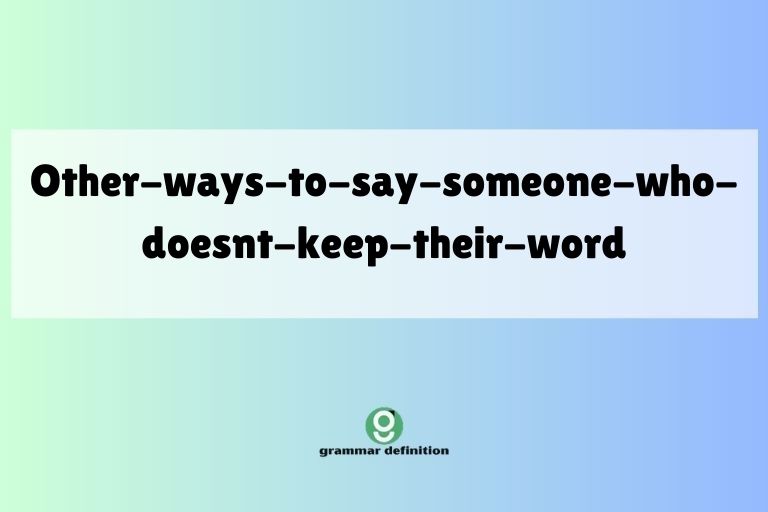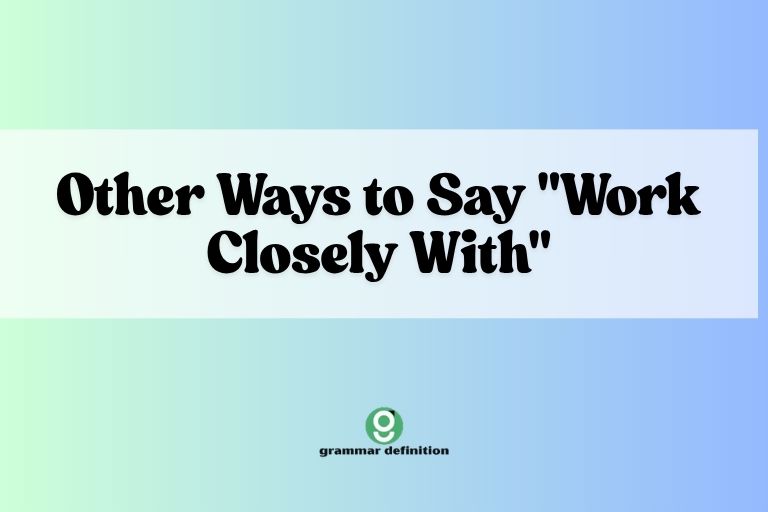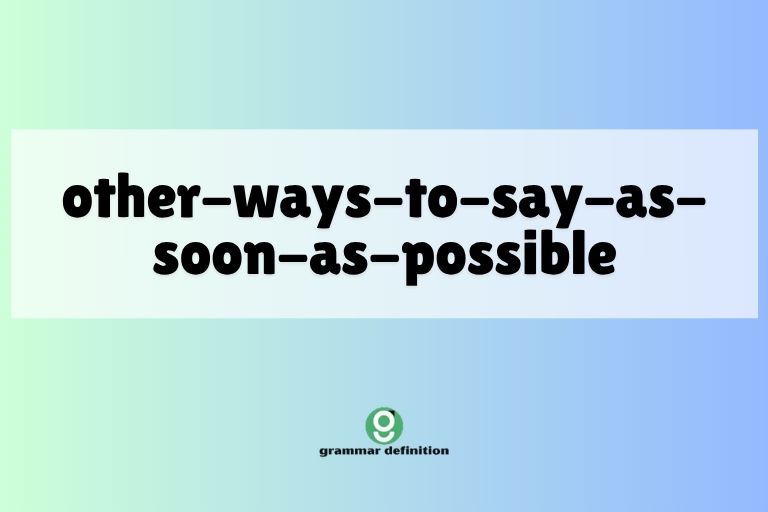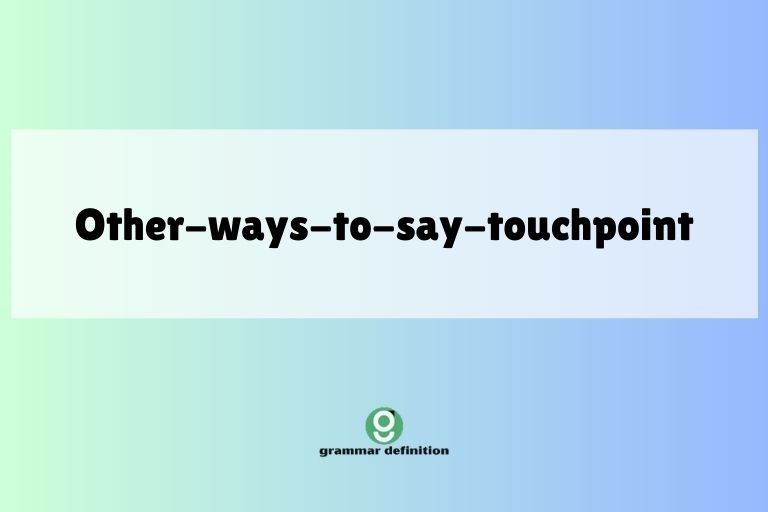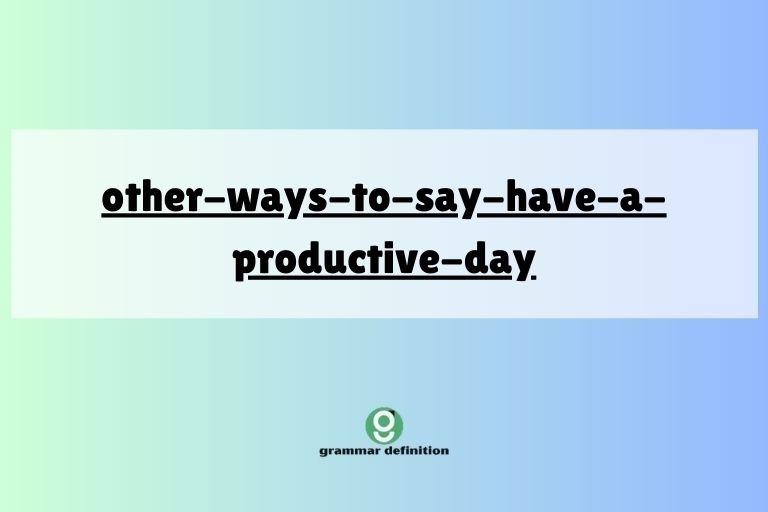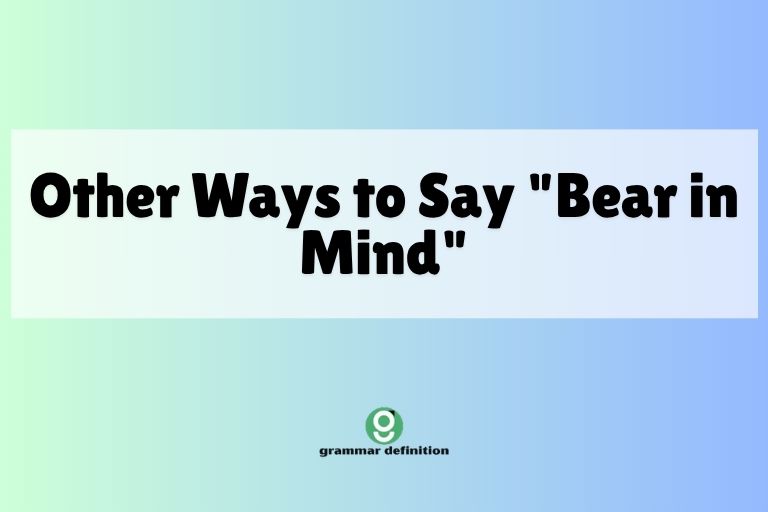Other Ways to Say “I Haven’t Heard From You”: A Grammar Guide
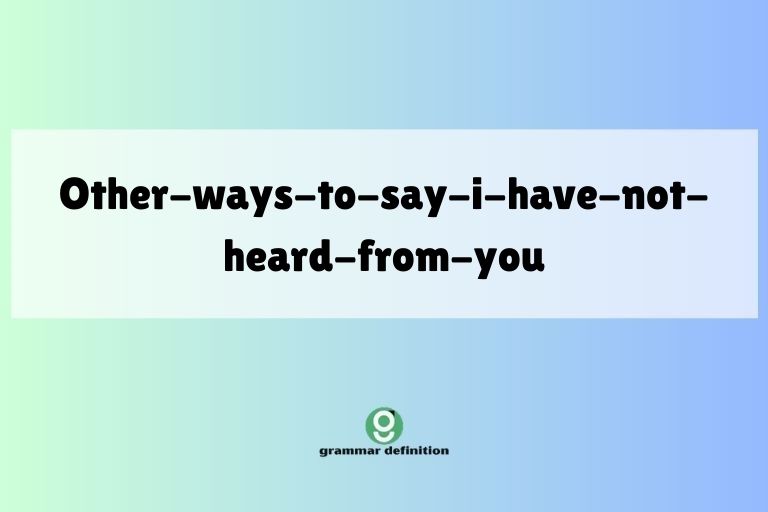
Communication is the lifeblood of relationships, both personal and professional. When silence falls, it’s natural to wonder why.
Expressing this concern in varied and grammatically correct ways is crucial for effective communication. This article explores numerous alternatives to the phrase “I haven’t heard from you,” providing you with the tools to express yourself clearly and professionally.
Whether you are a student aiming to improve your writing skills, a professional seeking to enhance your communication, or simply someone curious about language nuances, this guide will equip you with the vocabulary and grammar to articulate your concerns effectively.
Mastering these alternatives not only enhances your communication skills but also demonstrates your command of the English language. This in turn, can lead to more productive and meaningful conversations.
Let’s dive into the different ways you can express that you’re awaiting a response.
Table of Contents
- Definition and Explanation
- Structural Breakdown
- Types and Categories
- Examples
- Usage Rules
- Common Mistakes
- Practice Exercises
- Advanced Topics
- FAQ
- Conclusion
Definition and Explanation
The phrase “I haven’t heard from you” is a common expression used to indicate that the speaker has not received any communication from the person they are addressing. This lack of communication can be in the form of a phone call, email, letter, text message, or any other method of contact.
The expression can convey a range of emotions, from mild curiosity to concern or even disappointment, depending on the context and relationship between the speakers.
Grammatically, “I haven’t heard from you” is a present perfect negative statement. The present perfect tense (have/has + past participle) is used to describe an action that started in the past and continues to the present, or an action that happened at an unspecified time in the past but has relevance to the present.
The “not” negates the action of hearing. The preposition “from” indicates the source of the communication.
Understanding the nuances of this simple phrase is crucial for conveying your message effectively. The alternatives presented in this article offer a variety of ways to express the same sentiment with different levels of formality and emotional undertones.
Choosing the right alternative can significantly impact how your message is received.
Structural Breakdown
The basic structure of “I haven’t heard from you” can be broken down as follows:
- Subject: I
- Auxiliary Verb: have
- Negative Particle: not (contracted to n’t)
- Past Participle of Main Verb: heard
- Preposition: from
- Object of Preposition: you
Many alternative phrases follow similar structural patterns, but they may use different verbs, prepositions, or adverbs to convey slightly different meanings. For example, you could replace “heard” with “received,” “gotten,” or “been in touch.” The choice of words affects the tone and emphasis of the message.
Consider these variations:
- Direct Question: “Have you had a chance to get back to me?” (Subject-verb inversion for questions)
- Passive Voice: “No response has been received from you.” (Formal and impersonal)
- Emphasis on Time: “It’s been a while since I last heard from you.” (Highlights the duration of silence)
Types and Categories
The alternatives to “I haven’t heard from you” can be categorized based on formality, directness, and the specific nuance they convey. Here’s a breakdown of different categories:
Formal Alternatives
These phrases are suitable for professional settings, such as emails to colleagues, clients, or superiors. They often use more sophisticated vocabulary and avoid contractions.
Informal Alternatives
These phrases are appropriate for casual conversations with friends, family, or close colleagues. They often use contractions and colloquial language.
Neutral Alternatives
These phrases strike a balance between formality and informality. They are suitable for a wide range of situations and relationships.
Alternatives Emphasizing Concern
These phrases express concern for the recipient’s well-being or situation. They are appropriate when you have reason to believe the person may be facing difficulties.
Alternatives Implying Urgency
These phrases suggest that a response is needed promptly. They are suitable when there is a deadline or time-sensitive matter at hand.
Examples
This section provides a wide range of examples, categorized by formality, to illustrate the various ways to express that you haven’t heard from someone.
Informal Examples
These examples are suitable for friends, family, and close colleagues. The tone is relaxed and friendly.
The following table provides examples of informal ways to say “I haven’t heard from you.”
| Informal Phrase | Example Sentence |
|---|---|
| Haven’t heard a peep. | “Haven’t heard a peep from you lately! Everything okay?” |
| What’s up? Haven’t heard from you. | “What’s up? Haven’t heard from you in ages!” |
| Long time no talk! | “Long time no talk! How have you been?” |
| Just checking in. | “Just checking in to see how you’re doing.” |
| Been meaning to reach out. | “Been meaning to reach out, how’s everything going?” |
| No word yet? | “No word yet? Just wondering about the project.” |
| Still waiting to hear back. | “Still waiting to hear back from you about dinner.” |
| You still alive? (humorous) | “Hey! You still alive? Just kidding, but I haven’t heard from you.” |
| Just wanted to see if you’re okay. | “Just wanted to see if you’re okay, haven’t heard from you recently.” |
| Everything alright? | “Everything alright? I haven’t gotten any updates from you.” |
| What’s been happening? | “What’s been happening? Haven’t seen you online either.” |
| Any news? | “Any news? I’m curious about your trip.” |
| Just touching base. | “Just touching base to see if you’re free this weekend.” |
| Hope all is well! | “Hope all is well! Haven’t heard from you in a while.” |
| What’s the latest? | “What’s the latest? I’m eager to hear your thoughts.” |
| Missing your updates! | “Missing your updates! Hope you’re doing great.” |
| Where have you been hiding? | “Where have you been hiding? I’ve been trying to get ahold of you.” |
| Just dropping a line. | “Just dropping a line to say hi and see how you are.” |
| Still waiting on your reply. | “Still waiting on your reply about the weekend plans.” |
| Any updates on…? | “Any updates on the concert tickets?” |
| Hey, just checking in! | “Hey, just checking in! Let me know when you’re free.” |
| What’s new with you? | “What’s new with you? I’d love to catch up soon!” |
| Hope you’re doing great! | “Hope you’re doing great! Looking forward to hearing from you.” |
| Any progress on that? | “Any progress on that book you were writing?” |
Formal Examples
These examples are suitable for professional emails, letters, and formal conversations. The tone is respectful and courteous.
The following table provides examples of formal ways to say “I haven’t heard from you.”
| Formal Phrase | Example Sentence |
|---|---|
| I am writing to follow up on… | “I am writing to follow up on my previous email regarding the contract.” |
| I have yet to receive a response. | “I have yet to receive a response to my inquiry of July 15th.” |
| We have not yet received your feedback. | “We have not yet received your feedback on the proposed changes.” |
| I am inquiring about the status of… | “I am inquiring about the status of my application.” |
| I am reaching out to inquire whether… | “I am reaching out to inquire whether you received my earlier communication.” |
| To date, we have not received confirmation. | “To date, we have not received confirmation of your attendance.” |
| I would appreciate an update regarding… | “I would appreciate an update regarding the project timeline.” |
| I am keen to learn more about… | “I am keen to learn more about your decision on the proposal.” |
| Kindly provide an update at your earliest convenience. | “Kindly provide an update at your earliest convenience regarding this matter.” |
| I am hoping for an update on… | “I am hoping for an update on the pending invoice.” |
| Our team is awaiting your input on… | “Our team is awaiting your input on the design specifications.” |
| We are still expecting your response to… | “We are still expecting your response to our request for information.” |
| I trust this email finds you well and look forward to hearing from you. | “I trust this email finds you well and look forward to hearing from you soon.” |
| I am following up on my previous communication. | “I am following up on my previous communication sent on May 1st.” |
| We have not had the opportunity to discuss… | “We have not had the opportunity to discuss the upcoming conference.” |
| Please advise on the status of… | “Please advise on the status of the submitted documents.” |
| I await your prompt response. | “I await your prompt response to this urgent matter.” |
| We have not yet had the pleasure of your feedback. | “We have not yet had the pleasure of your feedback on our latest product.” |
| I would be grateful for your insights into… | “I would be grateful for your insights into this complex situation.” |
| We anticipate your feedback. | “We anticipate your feedback as soon as possible.” |
| No communication has been received. | “To date, no communication has been received regarding the requested data.” |
| We look forward to your prompt reply. | “We look forward to your prompt reply to ensure project continuity.” |
| I kindly request an update. | “I kindly request an update on the progress of the investigation.” |
Neutral Examples
These examples are suitable for a wide range of situations, striking a balance between formality and informality.
The following table provides examples of neutral ways to say “I haven’t heard from you.”
| Neutral Phrase | Example Sentence |
|---|---|
| Just wanted to check in. | “Just wanted to check in and see if you’ve had a chance to look at the proposal.” |
| I’m still waiting for your reply. | “I’m still waiting for your reply regarding the meeting time.” |
| Have you had a chance to…? | “Have you had a chance to review the documents?” |
| Any updates on…? | “Any updates on the project status?” |
| Let me know if you need anything. | “Let me know if you need anything or have any questions.” |
| Just following up. | “Just following up on my previous email.” |
| Still haven’t heard back. | “Still haven’t heard back from you about the decision.” |
| Wondering if you’ve made a decision. | “Wondering if you’ve made a decision on the matter.” |
| Checking in to see if you need anything. | “Checking in to see if you need anything or have any questions about the report.” |
| Let me know when you get a chance. | “Let me know when you get a chance to respond.” |
| I’m looking forward to your response. | “I’m looking forward to your response regarding the next steps.” |
| Any news on that front? | “Any news on that front? I’m eager to hear your thoughts.” |
| Just a quick follow-up. | “Just a quick follow-up on our last conversation.” |
| I’m still awaiting feedback. | “I’m still awaiting feedback on the draft.” |
| Could you please provide an update? | “Could you please provide an update on the progress of the work?” |
| I’m keen to hear your thoughts. | “I’m keen to hear your thoughts on the proposal.” |
| Please let me know your availability. | “Please let me know your availability for a meeting next week.” |
| Awaiting your input. | “Awaiting your input on the final design.” |
| Any updates on the matter? | “Any updates on the matter we discussed last week?” |
| I’d appreciate your reply. | “I’d appreciate your reply when you have a moment.” |
| Looking forward to your response. | “Looking forward to your response regarding the revised budget.” |
| Please confirm receipt of this message. | “Please confirm receipt of this message at your earliest convenience.” |
| Your input is needed. | “Your input is needed to finalize the project plan.” |
Usage Rules
When choosing an alternative to “I haven’t heard from you,” consider the following usage rules:
- Formality: Select a phrase that matches the formality of the context and your relationship with the recipient.
- Directness: Decide whether you want to be direct or more subtle in your inquiry.
- Tone: Pay attention to the emotional tone of the phrase. Avoid phrases that could be interpreted as accusatory or demanding.
- Clarity: Ensure that your message is clear and easy to understand. Avoid using overly complex language or jargon.
- Specificity: If possible, be specific about what you are waiting to hear back about.
For example, in a formal email, you might write, “I am writing to follow up on my previous email regarding the contract. I would appreciate an update at your earliest convenience.” In a casual text message to a friend, you might write, “Hey!
What’s up? Haven’t heard from you in ages!”
Common Mistakes
Here are some common mistakes to avoid when using alternatives to “I haven’t heard from you”:
| Incorrect | Correct | Explanation |
|---|---|---|
| “I am waiting your reply.” | “I am waiting for your reply.” | The preposition “for” is necessary after “waiting.” |
| “Have you had chance to reply?” | “Have you had a chance to reply?” | The article “a” is needed before “chance.” |
| “I am follow up on my email.” | “I am following up on my email.” | The verb “follow” requires the “-ing” form in this context. |
| “Any news yet?” | “Any news yet?” (Informal, but acceptable) or “Are there any updates yet?” (More formal) | “Any news yet?” is grammatically correct but can sound abrupt in formal contexts. |
| “I am still await your response.” | “I am still awaiting your response.” | “Awaiting” is the correct verb form in this sentence. |
| “I hope you are fine and hear from you.” | “I hope you are well and look forward to hearing from you.” | The correct idiom is ‘look forward to hearing from you.’ |
Practice Exercises
Test your understanding with these practice exercises.
Exercise 1: Fill in the Blanks
Fill in the blanks with the most appropriate phrase from the options provided.
Instructions: Choose the best phrase from the list below to complete each sentence.
Phrase Options:
- I am writing to follow up
- Just checking in
- I have yet to receive
- Any updates on
- Let me know
| Question | Answer |
|---|---|
| 1. ________ to see if you need anything. | Just checking in |
| 2. ________ your feedback on the proposal. | I have yet to receive |
| 3. ________ on my previous email. | I am writing to follow up |
| 4. ________ the project status? | Any updates on |
| 5. ________ if you have any questions. | Let me know |
| 6. ________ the status of my application. | Any updates on |
| 7. ________ to see if you’re free this weekend. | Just checking in |
| 8. ________ your thoughts on the matter. | I am writing to follow up |
| 9. ________ your response to the request. | I have yet to receive |
| 10. ________ if you need any help with the assignment. | Let me know |
Exercise 2: Rewriting Sentences
Rewrite the following sentences using a more formal or informal alternative to “I haven’t heard from you.”
Instructions: Rewrite each sentence using a more formal or informal alternative to “I haven’t heard from you,” as indicated in parentheses.
| Question | Answer |
|---|---|
| 1. I haven’t heard from you about the meeting. (Formal) | I am writing to follow up on the meeting and would appreciate an update. |
| 2. I haven’t heard from you in a while! (Informal) | Hey, what’s up? Long time no talk! |
| 3. I haven’t heard from you regarding the proposal. (Neutral) | Just checking in to see if you’ve had a chance to look at the proposal. |
| 4. I haven’t heard from you about the decision. (Formal) | I am inquiring about the status of the decision. |
| 5. I haven’t heard from you lately. (Informal) | Haven’t heard a peep from you lately! Everything okay? |
| 6. I haven’t heard from you about the payment. (Neutral) | Any updates on the payment? |
| 7. I haven’t heard from you since last week. (Formal) | To date, I have not received any communication since our last meeting. |
| 8. I haven’t heard from you. (Informal) | Hey, you still alive? Just kidding, but I haven’t heard from you. |
| 9. I haven’t heard from you concerning the agreement. (Neutral) | I’m still waiting for your reply regarding the agreement. |
| 10. I haven’t heard from you. (Formal) | I have yet to receive a response from you. |
Advanced Topics
For advanced learners, consider exploring these more complex aspects:
- Subjunctive Mood: Using the subjunctive mood to express hypothetical situations or wishes related to communication. Example: “I wish I had heard from you sooner.”
- Implied Meaning: Understanding how silence itself can be a form of communication, and how to interpret the reasons behind it.
- Cultural Differences: Recognizing that communication styles and expectations vary across cultures.
Understanding these advanced topics can further refine your communication skills and sensitivity.
FAQ
Here are some frequently asked questions about alternatives to “I haven’t heard from you”:
- Is it rude to say “I haven’t heard from you”?
It depends on the context. In formal settings, it can sound slightly accusatory. Using a more polite alternative, such as “I am writing to follow up,” is often preferable. In informal settings, it’s generally acceptable.
- What’s the most professional way to say “I haven’t heard from you”?
A professional alternative is “I am writing to follow up on my previous communication.” This phrase is courteous and clearly indicates that you are expecting a response.
- How can I express concern when I haven’t heard from someone?
You can say, “I hope everything is alright. I haven’t heard from you recently, and I wanted to check in.” This shows concern for their well-being.
- What if I need a response urgently?
You can say, “I am following up on this matter as it requires urgent attention. Please provide an update at your earliest convenience.”
- What are some informal ways to say “I haven’t heard from you”?
Informal alternatives include “Hey, what’s up? Haven’t heard from you in ages!” or “Just checking in to see how you’re doing.”
- How do I avoid sounding demanding when following up?
Use phrases like “I would appreciate an update when you have a moment” or “Please let me know if you need anything from my end.” These phrases are polite and non-demanding.
- What if I sent multiple emails and still haven’t received a response?
You could say, “I’m sending another follow-up regarding this matter. I understand you’re busy, but your input is crucial for us to proceed.” This acknowledges their potential busyness while emphasizing the importance of their response.
- How can I politely remind someone of a deadline?
You can say, “Just a friendly reminder about the deadline for [task/project] on [date]. Please let me know if you have any questions or need any assistance.” This is a gentle and helpful way to remind them.
Conclusion
Mastering the art of expressing that you haven’t heard from someone is crucial for effective communication. By understanding the nuances of different phrases and choosing the right alternative for each situation, you can convey your message clearly, professionally, and with the appropriate tone.
This article has provided you with a comprehensive guide to various alternatives, usage rules, common mistakes to avoid, and practice exercises to hone your skills.
Remember to consider the context, your relationship with the recipient, and the specific nuance you want to convey when choosing your words. With practice and attention to detail, you can confidently and effectively communicate your need for a response in any situation.
Keep practicing, and your communication skills will surely improve!

